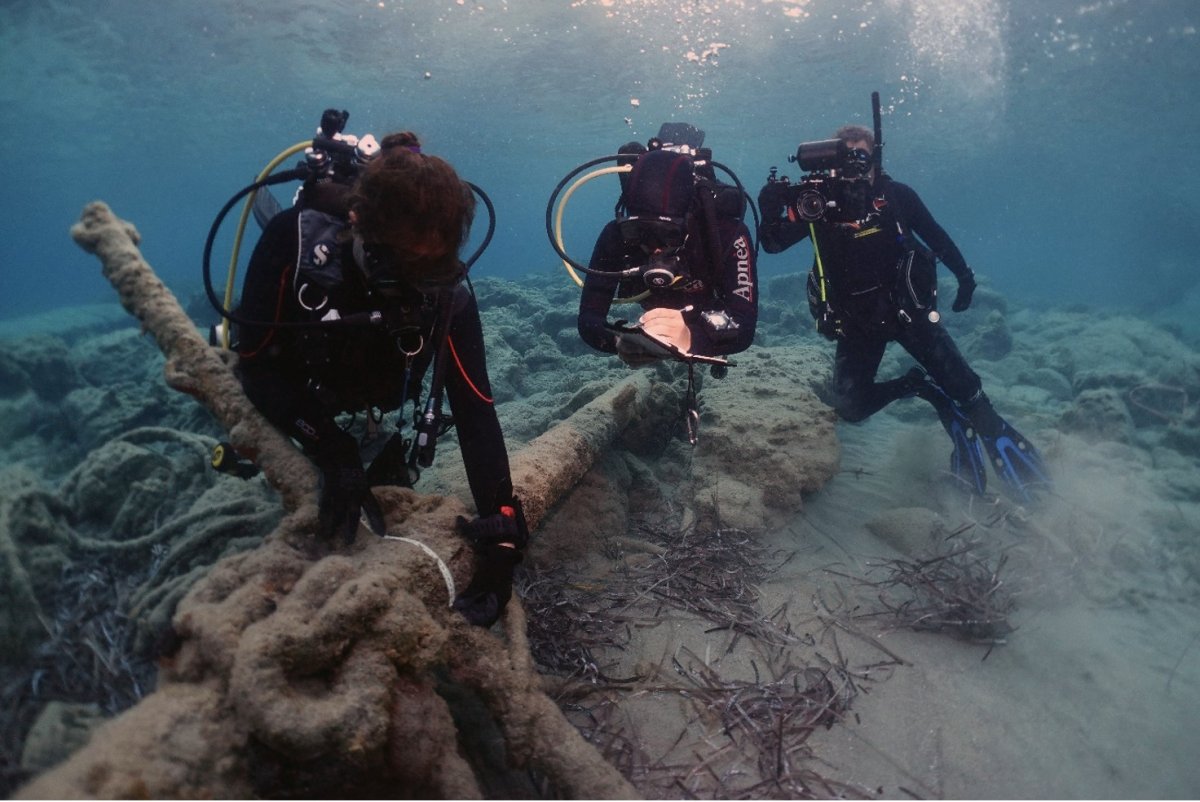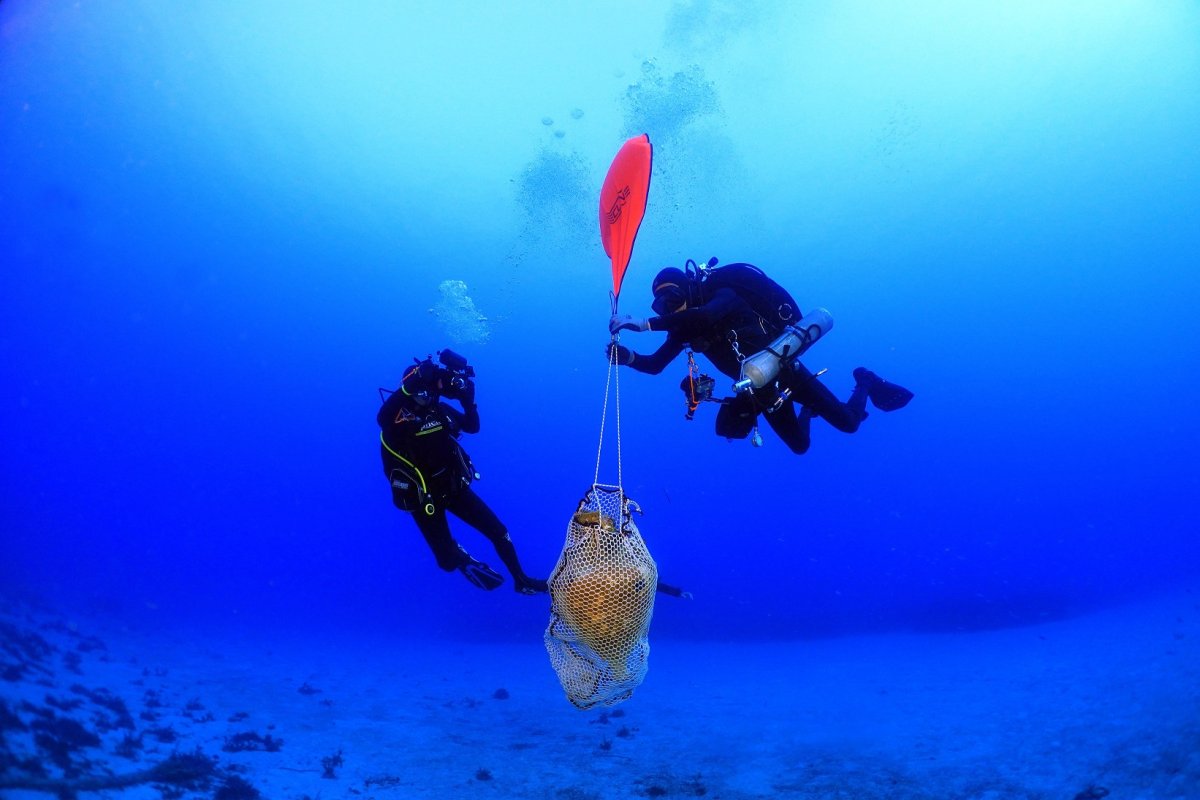Marine archaeologists have identified 10 shipwrecks, including one from the Roman era, in the waters around a Greek island in the Mediterranean.
The finds came to light during a multiyear project carried out by a team in collaboration with Greece's National Hellenic Research Foundation and the country's Ministry of Culture.
The project has been surveying an area around the island of Kasos, which lies in the Aegean Sea, a portion of the Mediterranean between the Greek peninsula to the west and Turkey's Anatolia peninsula to the east.
"This research was conducted to shed light on the maritime history of the Aegean region, with a particular focus on the island of Kasos," Xanthie Argiris, one of the marine archaeologists who led the project, told Newsweek.

"This island has long been overlooked in historical narratives, and we aimed to uncover its significance in ancient maritime networks," Argiris continued. "By exploring the underwater cultural heritage of the region, we sought to reveal Kasos' role as a crucial node along ancient trade routes, thus contributing to our understanding of the broader historical and archaeological context of the southeastern Aegean."
During recent investigations, the team identified evidence of 10 shipwrecks and important individuals finds from a variety of historical periods. The shipwrecks date from as early as the Classical era (around 500 B.C.) until as recently as the 19th and 20th centuries, according to Argiris.
"This extensive temporal range reflects the long history of maritime activity in the Aegean region and highlights the significance of Kasos as a maritime crossroads throughout the ages," Argiris said.
Among the finds was a Roman shipwreck likely dated to the second to third centuries, which was carrying a cargo of Aegean cylindrical amphorae—an ancient type of storage vessel.
Ancient shipwrecks are primarily identified by their ceramic cargo (and/or anchors) and very rarely by their wooden hull remains.
"The preservation of organic materials underwater depends on environmental conditions, and the Aegean Sea does not, in most cases, favor the preservation of wood," Argiris said.
Out of the 10 shipwrecks the researcher found, seven were ancient and did not preserve any hull, only the cargo. One is represented by part of a wooden hull associated with an iron cannon—tentatively dated to the 19th century. Two are more modern, preserving metallic and/or wooden parts.
One of the more modern wrecks is a vessel that possibly dates from the World War II era. This vessel is a wooden boat with metal elements, estimated at 82 to 98 feet long.
The researchers also made a number of individual, or "stray," finds of varying origins and periods, including prehistory, the Classical period, the Hellenistic period (around 100 B.C. to A.D. 100), the Roman years (around 200 B.C. to A.D. 300), the Byzantine period (around A.D. 800 to A.D. 900) and even finds from the later medieval and Ottoman periods.
"When we talk about individual or stray finds, we refer to the finds that cannot be associated with a shipwreck or an underwater site," Argiris said. "Examples of the stray finds we have discovered in Kasos are different period amphorae, archaic and Byzantine anchors, cannons, medieval and postmedieval bowls, a large storage jar from Djerba of Tunisia and others."
"Individual finds, when examined meticulously, possess the potential to contribute to the reconstruction of maritime journeys," Argiris went on. "Consequently, every stray find, exactly like a shipwreck, can be approached as a valuable indicator of past maritime transport activities."
One of the most "remarkable" discoveries from the recent investigations is an isolated prehistoric artifact dating back to the third millennium B.C. This handmade pot represents the oldest recorded find ever retrieved from the waters of the Dodecanese, a group of Greek islands in the southeastern Aegean that includes Kasos, according to the researchers.

"The archaeological significance of our discoveries is multifaceted," Argiris said. "First, they provide concrete evidence of the maritime activities that occurred in the Aegean region over millennia, offering insights into ancient trade networks, navigation routes and cultural exchanges. They help us understand the economic, social and political dynamics of ancient societies, as evidenced by the types of cargo and artifacts found.
"They also enrich our knowledge of specific periods in history, from the prehistoric era to the modern age, filling gaps in our understanding of maritime activities during these times," Argiris said.
The findings also have practical implications for contemporary society, including heritage preservation, tourism development and fostering cultural appreciation and understanding, she said.
"By studying and documenting these underwater cultural heritage sites, we can ensure their protection and promote their significance to the wider public," Argiris said.
The marine archaeologist said the continuation of the team's research in the coming years hinges significantly on securing adequate funding.
"Underwater research, especially in remote locations like Kasos and Karpathos, involves substantial costs, including equipment, transportation, and logistics. All this comes hand in hand with the expertise of the people involved," Argiris said.
"It's important to note that most of the team members, including researchers, archaeologists, historians, surveyors, architects, conservators, and others, are volunteers and do not receive compensation for their work, highlighting their dedication to advancing our understanding of our maritime heritage."
Do you have a tip on a science story that Newsweek should be covering? Do you have a question about archaeology? Let us know via science@newsweek.com.
Update 03/22/24, 12:21 p.m. ET: This article has been updated with additional comments from Xanthie Argiris.
Uncommon Knowledge
Newsweek is committed to challenging conventional wisdom and finding connections in the search for common ground.
Newsweek is committed to challenging conventional wisdom and finding connections in the search for common ground.
About the writer
Aristos is a Newsweek science reporter with the London, U.K., bureau. He reports on science and health topics, including; animal, ... Read more
To read how Newsweek uses AI as a newsroom tool, Click here.






